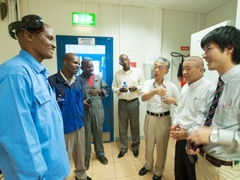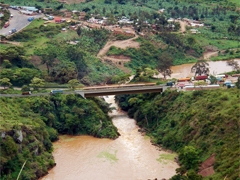- Home
- Countries & Regions
- Africa
- Rwanda
- What Does JICA Do in Rwanda?
- Economic infrastructure
What Does JICA Do in Rwanda?
Economic infrastructure
Overview of the Program for Improvement of Economic Infrastructure
The Rwandan Government has stated that one of its key goals as part of its Vision 2020 is to improve the country's infrastructure in order to bring about significant economic growth. This includes developing the country's transport links and energy supplies. JICA's support in this sector therefore focuses on these areas, using Japanese expertise to help find Rwandan solutions.
In the energy sector, JICA is supporting the improvement of the substations and electricity distribution system across Kigali, Huye & Eastern province. JICA not only extends support to such hard infrastructure but also to capacity development for those working in the Energy Water and Sanitation Authority (EWSA), as well as brings in a senior adviser to help with the planning and implementation of electricity development projects. The adviser works hand in hand with EWSA staff to help improve its management systems.
In the transport sector, JICA is supporting for facilitation of trade among East African Community member countries by supporting the construction of a new Rusumo International Bridge and One Stop Border Post (OSBP) facilities at the Rusumo border between Rwanda and Tanzania. JICA is also helping to train customs officers across the EAC countries.
Building up Rwanda's energy sector (Grant aid, 2012 – 2013)
 JICA experts training EWSA engineers (Photo K.Imamura/JICA)
JICA experts training EWSA engineers (Photo K.Imamura/JICA)
Rwanda's aim is to bring electricity to 35% of households by 2020. Currently it is 14%, and operating with the current distribution system which now needs urgent attention in order to accommodate the needs of Rwanda's growing industrial and public service sectors, as well as individual households in the system.
JICA's support to the energy sector includes the rehabilitation of key substations in Kigali (Jabana and Gikondo), which will help to make the power supply system more reliable. JICA is also upgrading substations in the East, in Musha and Rwinkwavu, increasing their capacity from 70 kV to 110 kV, so they can serve more customers. JICA is also upgrading and expanding distribution networks in Huye and Kigali which will improve the electricity access rate and make the electricity more reliable.
Building organizational capacity of EWSA (Technical Cooperation, 2011 – 2014)
JICA not only builds hard infrastructure but also helps capacity building for better public service by developing skills of partner organizations through bringing Japanese experts to work hand in hand with them. In this way, JICA is helping EWSA to develop its organizational capacity so that it can train its own engineers and technicians by itself in a sustainable manner in terms of operation and maintenance. A team of seven Japanese experts in distribution & transmission system, and hydro & diesel power generation, is providing intensive practical training to EWSA CORE-trainer or CORE - engineers so that these core staff can train other engineers and technicians by themselves.
In this regards, JICA is supporting development of the ‘Training Policy' for EWSA, which shows the vision and the basic framework of how EWSA develops capacity of its own staff. Based on the ‘Training Policy', JICA is helping EWSA to develop its own training curriculum, manuals and text books for the core staff to train other engineers and technicians.
Under the framework of the project, JICA is supporting EWSA for developing capacity to create, operate and maintain the distribution database, using Geographical Information System technology, which has necessary information for efficient maintenance such as the location & specifications of electricity facilities.
Supporting energy sector development (Expert, July 2011 – Dec 2012)
JICA is working on developing effective connection between the policy level and the field level by bringing a senior adviser to the energy sector in order to help the Rwandan government to develop more effective policies. To this end, the senior adviser is working with the all levels of staff in Ministry of Infrastructure (MININFRA) and EWSA in order to identify challenges together and address them together.
 Old Rusumo bridge
Old Rusumo bridge
Improving border crossing between Rwanda and Tanzania (Grant aid, April 2012 – Nov 2014)
Rusumo Bridge is at the border between Rwanda and Tanzania and on the central corridor connecting the important port of Dar es Salaam, capital of Tanzania, with Kigali. It plays a significant role in regional logistics not only for Rwanda but also for other countries in the East African community (EAC).
The old single-lane Rusumo Bridge can only take vehicles under eight tones, travelling under 5kmph, therefore traffic moves slowly. Trucks carrying essential goods are also often waylaid by different layers of red tape each side of the border.
In collaboration with the Ministry of Infrastructure through the Rwanda Transport Development Agency, JICA will construct a new two-lane Rusumo Bridge, which will reduce axle load limit & speed limit from 8 tons to 20 tons and from 5km/h to 30km/h respectively.
The customs clearance procedure will also be streamlined to create a one-stop border post, halving the time it takes to cross the border. These improvements will boost trade, investment and competition not only in Rwanda and Tanzania but also across the EAC.
Capacity Building for Customs Administration (2nd Phase, Technical Cooperation, 2009 – 2013)
JICA is working to develop the skills set of customs officials to ensure the smooth functioning of the One Stop Border Post system. In order to achieve the goal, the main activities such as master trainer's program in important areas such as customs evaluation, facilitation of effective joint border surveillance and capacity building of customs agent association are being supported by several JICA experts from Japan Customs.

- Asia
- Oceania
- Latin America
- Africa
- Angola
- Benin
- Botswana
- Burkina Faso
- Burundi
- Cameroon
- Comoros
- Côte d'Ivoire
- Democratic Republic of the Congo
- Djibouti
- Eritrea
- Ethiopia
- Gabon
- Ghana
- Kenya
- Liberia
- Madagascar
- Malawi
- Mauritius
- Mozambique
- Namibia
- Niger
- Nigeria
- Rwanda
- Senegal
- Seychelles
- Sierra Leone
- Somalia
- South Africa
- South Sudan
- Sudan
- Tanzania
- Uganda
- Zambia
- Zimbabwe
- Middle East
- Europe
- About JICA
- News & Features
- Countries & Regions
- Our Work
- Thematic Issues
- Types of Assistance
- Partnerships with Other Development Partners
- Climate Change / Environmental and Social Considerations
- Evaluations
- Compliance and Anti-corruption
- Science and Technology Cooperation on Global Issues
- Research
- JICA Development Studies Program / JICA Chair
- Support for the Acceptance of Foreign HRs / Multicultural and Inclusive Community
- Publications
- Investor Relations
